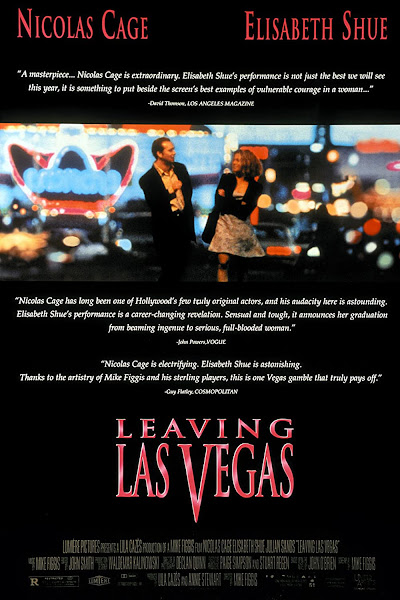Leaving Las Vegas (Film Review)

1995 MGM/United Artists
Written and Directed by: Mike Figgis (based on the novel by: John O'Brien)
Starring: Nicolas Cage, Elisabeth Shue, and Julian Sands
MPAA Rating: R; Running Time: 111 Minutes
The Nicsperiment Score: 7/10
L.A. screenwriter, Ben Sanderson, has such a large drinking problem, he's lost everything. When his screenwriting office sends him home with a pink slip, and a very large severance check, Ben decides to drive to Vegas and spend all the money on booze, until he drinks himself to death. Out on the strip, he meets Sera, a prostitute who doesn't seem to mind the pitfalls of Ben's alcoholism and who agrees to let Ben stay at her condo. Soon, Ben and Sera grow closer together--but will Ben's deteriorating condition eventually put an eternal gulf between the two?
1995's Leaving Las Vegas is a bleak look at alcoholism that perhaps unintentionally glorifies the alcoholic. As Sanderson, Nicholas Cage turns in, without hyperbole, one of the greatest performances in cinematic history. His pale, sweaty face, eyes sunk into his skull, conveys an enormous depth of pain. As Sera, Elisabeth Shue stands toe-to-toe with Cage, even if her role requires considerably less flash. Meanwhile, writer/director, Mike Figgis, creates a hypnotic atmosphere, composing his own jazz soundtrack to back his alternatingly dark and neon-lit imagery, despite a low budget. The film is a talent showcase for all involved, and yet...
Leaving Las Vegas can't help but enable its addict. Respect is given to Sera for letting Ben kill himself with booze in her loving company. The film is intercut with scenes of Sera addressing the camera at a later date, as she implores viewers to understand how much she loved Ben and just how great he was. These scenes highlight the alcoholic male fantasy at work here: you wreck your entire life, abandon your wife and child, get a huge severance check from your job because they can't deny how great of a guy you are, despite your abhorrent behavior, head to Vegas, and meet a beautiful woman who loves you unconditionally and thinks you are the greatest person alive for no apparent reason, and who wants to spend her every waking minute with you, even when you're assaulting casino employees and blacking out. While scenes of a stumbling, slurring, puking Cage bring home the horrors of alcoholism, the film's strange lionization of Ben is off-putting. I'm glad to have watched Leaving Las Vegas once to experience its incredible performances and Figgis' atmosphere, but its bleak subject matter and bizarre glorification of its central alcoholic insures that will be my only viewing.


Comments